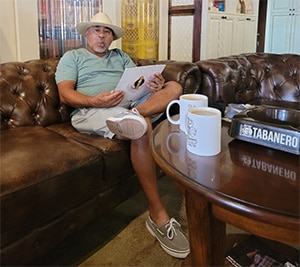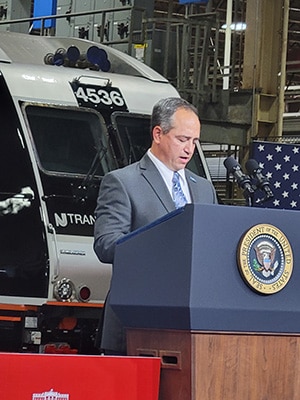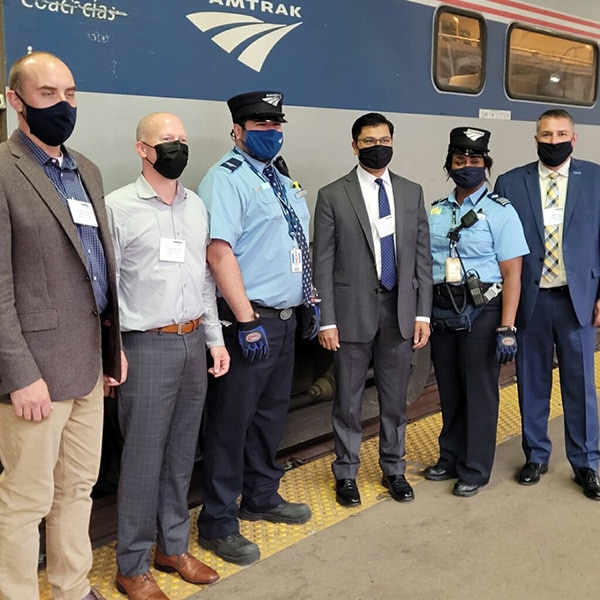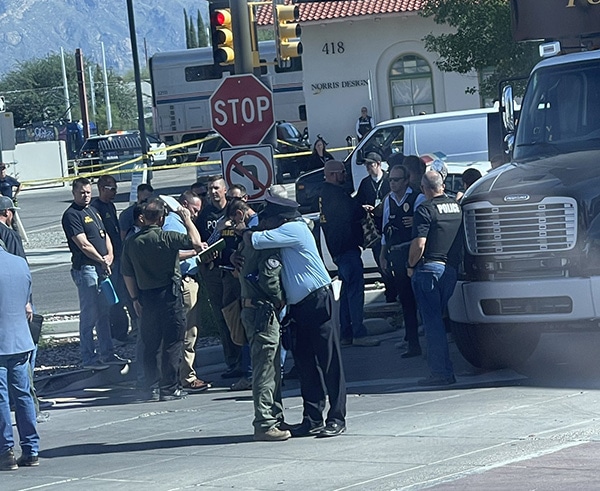Brother Tony Carbajal, a member of Local 807 (Tucson, Ariz.), passed away Oct. 27, 2021, from COVID-19 at the age of 51.
He joined the union in 2004 and worked as a conductor for Union Pacific for more than 17 years.
“Tony was well-liked and respected by his co-workers in Tucson,” said Chris Cheely, legislative secretary of the Arizona State Legislative Board and Local 807’s legislative representative.
A talented golfer and softball player, one of Brother Carbajal’s many hobbies was collecting cigars.
He is survived by the love of his life, Patricia; sons Eric, Gregory and Andrew and grandchildren Stephany and Bubba.
An online fundraiser has been established to assist his family in their time of loss.
A Celebration of Life and Rosary will be held noon on Sunday, November 7, 2021, at the Willcox Elks Lodge with a visitation beginning at 11 a.m. Private cremation will follow.
Author: bnagy
As President Joe Biden appeared Oct. 25 at the New Jersey Transit Meadowlands Maintenance Complex in Kearny, N.J., it was SMART Transportation Division New Jersey State Legislative Board Vice Chairperson Joseph Williams (GCA-770), a New Jersey Transit engineer, who set the stage for the president’s speech.
In his introduction of Biden, Williams thanked N.J. Gov. Phil Murphy and N.J. Transit’s Kevin Corbett for their work in helping NJT improve service as well as U.S. Rep. Tom Malinowski for his work on Congressional infrastructure efforts in the U.S. House.
“I personally believe that the current infrastructure bill is important to New Jersey Transit rail operations, the residents of New Jersey and our neighboring states,” Williams said. “The funding would rebuild and modernize our aging transportation network. The rehabilitation of our system will help to preserve and create new railroad jobs.”
Improvements to stations funded by the infrastructure effort also would remove impediments to access for N.J. Transit users, while the Gateway Project expansion would smooth out regional network challenges, Williams said.
“Our bridge and tunnel system into and out of New York is antiquated and unreliable,” Williams said. “Our general riding public that depends on this system to get to and from work deserves better.”
In his remarks, Biden, touring New Jersey as the bipartisan infrastructure bill and his Build Back Better agenda work through Congress, paid particular attention to the middle-class jobs created and the need for improvement in the nation’s roads, rails and bridges.
“We invested in ourselves and in our people, our families,” President Biden said. “Somewhere along the way, we took our eyes off the ball. Our infrastructure used to be the best in the world.”
Now, he said, 12 other nations are considered to have better infrastructure thanks to years of implementation of failed “trickle-down” strategies and at least a decade without a transformative bill to address deterioration has not helped.
One example familiar to the president’s audience at the speech is the New Jersey Portal Bridge, which is being targeted for replacement. Once considered “state of the art,” Biden said it’s an impediment, even as it continues to be what he described as “the busiest rail span in the Western Hemisphere.” It’s also prone to having the tracks misaligned with a sledgehammer needing to be used to set things to rights, he said.
The Portal project is just one item in an agenda that Biden promised would reinvigorate the nation’s railroad system and create 8,000 union jobs.
“I’m a train guy,” Biden said. “Because it’s also the single most significant way we can deal with air pollution and the single most significant way we can deal with global warming.
“With my infrastructure bill, we are going to make sure that projects like this are only the beginning … We are going to make the largest investment in public transportation in the history of America, replacing transit vehicles that are past their useful life and make the most-significant investment in rail since the creation of Amtrak 50 years ago.
“We need to get this done,” Biden said.
In early July 2020, just over eight months after the current round of national bargaining had begun, the carriers’ representative — the National Railway Labor Conference (NRLC) — proposed reconfiguring the National Plan’s network structure in a way that would force many railroad workers into the cheapest area medical network immediately and then on a continual 3- to 5-year schedule without formal bargaining.
The Cooperating Railway Labor Organizations (CRLO), which is the rail labor umbrella group that oversees plan administration in concert with the NRLC, rejected the proposal, stating that this was an issue for negotiations and pointing out that the carriers had made an identical proposal at the bargaining table. In late July, the NRLC demanded that the unions agree to the proposal and threatened to use the binding deadlock neutral process found in the 1991 National Agreement settlement to resolve the dispute.
This threat led 12 unions in the CRLO to file suit against the nation’s Class I railroad carriers in the United States District Court for the District of Columbia, asking the court to force the carriers to bargain in good faith with the unions over mandatory subjects of bargaining, such as their network structure proposal. The carriers’ defense was that this was a “minor” dispute under the Railway Labor Act, as it involved an administrative matter under the National Plan and, therefore, could be resolved by the “deadlock neutral” process that was included in national agreements for all unions that were imposed by Congress — and signed into law by President George H. W. Bush — in order to stop a national strike in 1991.
At an Aug. 31, 2021, hearing before a Special Board of Adjustment chaired by Arbitrator Joshua M. Javits, the unions documented the history of health care network development in the railroad industry, showing that the carriers’ proposal was anything but administrative in nature. They also showed the adverse impact the proposal would have on over a quarter-million plan participants. The carriers countered that no “right to choose” existed in any national agreement, and that the deadlock neutral had the authority to decide the matter if the parties couldn’t agree.
In upholding the unions’ position on the key question of network choice, Chairman Javits’ Oct. 20 award found “that the Carriers’ proposal – in as far as it relates to the selection of network vendors – is an administrative matter. However, those elements of the Carriers’ proposal that reduce choice for Plan participants and result in only a single network vendor being available to Plan participants, constitutes a change in Plan design and, thus, is outside the deadlock neutral’s jurisdiction.”
The leaders of the prevailing unions issued the following statement concerning this decision:
“This is a significant victory for the men and women covered by the national plans, and for their families. The carriers have been dragging their feet at the bargaining table while this dispute wound its way through the system. All the while, our members — essential employees, one and all — have continued to keep the country moving despite the pandemic.
“To the carriers, whose profits continued to flow in unabated, we say ‘The time for delay is over. Your workers have earned and deserve a new national agreement, one that reflects their true contribution to your bottom line.’ We remain ready to negotiate that agreement, and urge you to devote as much energy to that task as you invested in your failed effort to deprive your workers of their choice of medical networks.”
# # #
The unions involved in the dispute are the American Train Dispatchers Association; the Brotherhood of Locomotive Engineers and Trainmen; the Brotherhood of Maintenance of Way Employes; the Brotherhood of Railroad Signalmen; the International Association of Machinists and Aerospace Workers; the International Association of Sheet Metal, Air, Rail and Transportation Workers, Mechanical Division; the International Association of Sheet Metal, Air, Rail and Transportation Workers, Transportation Division; the International Brotherhood of Boilermakers; the International Brotherhood of Electrical Workers; the National Conference of Fireman & Oilers District, Local 32BJ, SEIU; the Transportation Communications Union/IAM; and the Transport Workers Union.
View this release in PDF form.
Federal Railroad Administration (FRA) Deputy Administrator Amit Bose’s nomination by President Joe Biden to become administrator of FRA was advanced Oct. 20 by the U.S. Senate’s Commerce, Science and Transportation Committee.
Along with Bose, the nomination of Meera Joshi to be administrator of the Federal Motor Carrier Safety Administration (FMCSA) also was advanced to the full U.S. Senate by a 22-6 committee vote. A timetable for the full Senate to consider Bose’s and Joshi’s nominations has not yet been set.
In related news, Bose was a passenger Oct. 13 aboard the Amtrak Wolverine route from Chicago to Detroit with three SMART Transportation Division state legislative directors and also appeared at a news conference at Chicago’s Union Station as the Midwest Interstate Passenger Rail Commission (MIPRC) unveiled its 40-year Midwest Regional Rail plan.
“Looking all the way through 2055, the plan addresses key corridor and investment priorities, potential funding strategies, and necessary governance structures identified by the states working with MIPRC,” Bose said. “While America’s interstate highway system and commercial aviation industry are vital and indispensable, rail can and does play a key role in our multi-modal transportation system,” Bose said. “Nowhere is that more evident than Chicago, the nation’s rail hub.”
SMART-TD Illinois State Legislative Director Bob Guy, chairman of the commission, as well as Michigan SLD Donald Roach and Minnesota SLD Nick Katich, all spent time with Bose during the trip before MIPRC began its three-day-long meeting.
“It was wonderful to be able to spend time with Deputy Administrator Amit Bose while he was in Chicago and on the train to Detroit as part of the MIPRC annual meeting,” Guy said. “It’s clear that he is very aware of our serious concerns and frustrations with the previous FRA hierarchy, but his openness, communication and availability to our members and our leadership are a testament to his priorities and provides a glimpse into how he values SMART-TD’s input on issues affecting our members.”
Bose also was a guest on the SMART-TD National Legislative Office’s monthly Zoom call Oct. 11 where he discussed concerns brought up by both national and state officers.
A full recap of the wide-ranging discussion that Deputy Administrator Bose had with SMART-TD officers will be published in the next edition of the SMART-TD News.
A DEA officer was killed, as was a suspect, and two other law enforcement officers were wounded when gunfire erupted inside Amtrak’s Sunset Limited train the morning of Oct. 4 while it was stopped at the Southern Arizona Transportation Museum in Tucson.
One suspect was in custody, according to media reports, and none of the 137 passengers or 11 crew members aboard the train were injured in the incident, which authorities said was precipitated by a routine search for illegal contraband and drugs aboard the train.
Video of the incident as it happened was captured by a live railfan cam at the museum station.
Terrence Dicks, a 20-year member of our union and a member of Local 84 (Los Angeles, Calif.) who was the conductor on the train when the gun battle happened, can be seen in a photo provided to The Associated Press and other media outlets on Twitter by passenger Evan Courtney providing comfort to a Tucson police officer who had responded to the scene.
The identities of the slain DEA agent, the injured officers nor the suspects were not released at the time of this article’s publication.
“We express our most heartfelt sorrow to the law enforcement brothers and sisters of the DEA agent who was killed in this senseless act of violence, and we wish for rapid recoveries for the two wounded officers,” said SMART Transportation Division National Legislative Director Gregory Hynes. “We also express relief that the incident in Tucson did not result in additional casualties among the passengers and crew who were aboard the train.
“But that such an incident happened during a routine stop and search exposes a great flaw in the security measures currently used on our nation’s passenger rail system. We again call upon Congress to enact measures that bring the level of security screenings aboard the nation’s passenger trains to where they are in the nation’s airports.”
SMART-TD initially called for such measures by federal agencies soon after the Jan. 6, 2021, insurrection at the nation’s capital.
Last last week, FTA published new bus and rail safety data reports to provide a snapshot of transit industry safety performance from 2007–2018 for rail and 2008–2018 for bus, and focus on patterns and trends in events, fatalities and injuries. Report summaries and full reports are accessible on the FTA website with a list of detailed links below.
FTA will host a webinar from 1 to 2 p.m. Eastern, Tuesday, Oct. 5, 2021, to provide an overview of the new reports. Registration is available on the FTA website.
The U.S. Railroad Retirement Board (RRB) named Arturo Cardenas as the agency’s Director of Programs, the agency announced in a Sept. 24 release.
Cardenas oversees all operations to process and pay benefits administered by the agency. He will also serve on the RRB’s Executive Committee responsible for day-to-day operations of the agency and making policy recommendations to the three-member Board.
A career public servant, Mr. Cardenas worked at the Social Security Administration (SSA) for more than 30 years before joining RRB. During that time, he worked in a variety of positions in SSA field offices, regional offices and headquarters units.
His appointment was effective Aug. 30. He replaces Crystal Coleman, who retired in April 2021 after 29 years of federal service.



